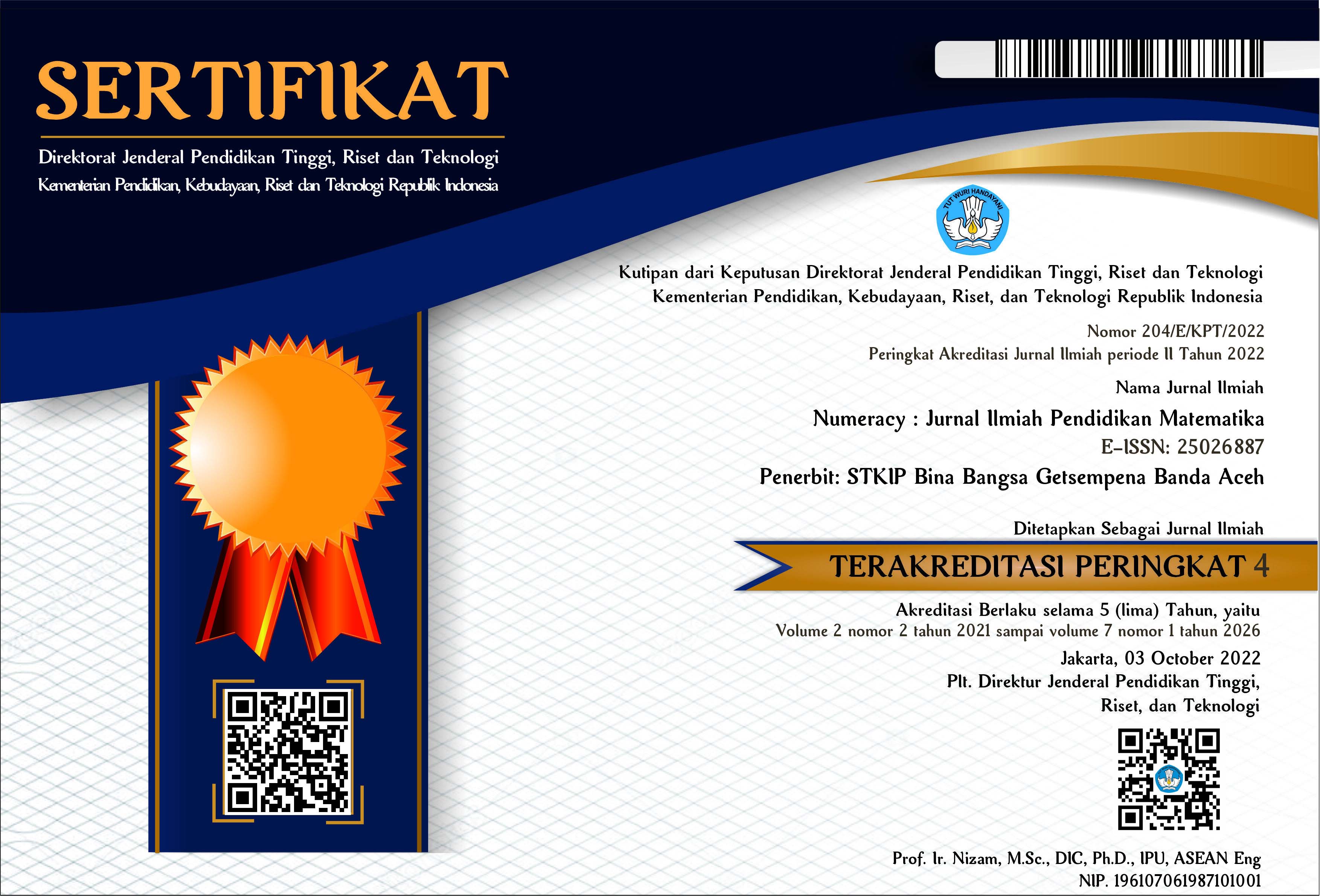UJI KEVALIDAN PERANGKAT PEMBELAJARAN PBLPR MATERI PECAHAN UNTUK MENINGKATKAN DISPOSISI MATEMATIK DAN KEMAMPUAN PEMECAHAN MASALAH
Abstract
This study aims to determine the characteristics of learning mathematics using PBLPR (Problem Based Learning with Realistic Approach), and produce a valid learning tool PBLPR. The subjects of this research are grade 4th students of primary school. The data obtained from the results of the research data qualitative device tested with expert validation. Basically, this research is the development of learning tools to produce: (1) learning that has characteristics of orientation related problems in everyday life, organizing students to examine realistic problem solving, cooperative planning, investigation, data collection and experimentation of realistic problem solving, hypothesis development , explanation, and providing realistic solutions to problem solving by students. (2) instructional devices are valid by expert.
Abstrak
Penelitian ini bertujuan untuk untuk mengetahui karakteristik pembelajaran matematika menggunakan PBLPR (Problem Based Learning dengan Pendekatan Realistik), dan menghasilkan perangkat pembelajaran PBLPR yang valid. Subyek ujicoba penelitian ini adalah siswa kelas IV sekolah dasar. Data hasil penelitian diperoleh dari data kualitatif perangkat yang diuji dengan validasi ahli. Pada dasarnya penelitian ini merupakan pengembangan perangkat pembelajaran menghasilkan: (1) pembelajaran yang mempunyai karakteristik adanya orientasi permasalahan terkait dalam kehidupan sehari-hari, pengorganisasian siswa untuk meneliti pemecahan masalah realistik, perancanaan kooperatif, investigasi, pengumpulan data dan eksperimentasi pemecahan masalah realistik, pengembangan hipotesis, penjelasan, dan pemberian solusi pemecahan masalah realistik oleh siswa. (2) perangkat pembelajaran valid menurut pakar.
Kata kunci: Validitas, Problem Based Learning, Pendekatan Realistik, Disposisi Matematik (DM), Kemampuan Pemecahan Masalah (KPM)
References
Du, X., et al. 2013. “PBL and Critical Thinking Disposition in Chinese Medical Students–A Randomized Cross-Sectional Study”. Journal of Problem Based Learning in Higher Education. Volume 1. No. 1. Hal 72-83.
Kilpatrick, J., J. Swafford., & B. Findell. 2001. Adding It Up: Helping Children Learn Mathematics. Washington, DC: National Academy Press. Li, L. 2009. “A Realistic Approach to Calculate VaR”. Journal International Journal of Economics and Finance. Volume 1. No. 2. Hal 81-87.
NCTM. 1989. Evaluation: standard 10-mathematical Disposition. http://www.fayar.net/east/teacher.web/math/standards/previous/CurrEvStds/evals10.html (diakses 24 Januari 2014).
_____. 2000. Standards for Secondary Mathematics Teachers. http://www.ncate.org/LinkClick.aspx?fileticket=ePLYvZRCuLg%3D&tabid=676 (diunduh 23 Januari 2014).
Nowrouzian, F. L., & A. Farewell. 2013. “The Potential Improvement of Team-Working Skills in Biomedical and Natural Science Students Using a Problem-Based Learning Approach”. Journal of Problem Based Learning in Higher Education. Volume 1. No. 1. Hal 84-93.
Polya, G. 1973. How to Solve It. USA: Princeton University Press.
Rochmad. 2012. “Desain Model Pengembangan Perangkat Pembelajaran Matematika”. Jurnal Kreano. Volume 3 No. 1. Hal 59-72.
Sugiyono. 2010. Metode Penelitian Kuantitatif dan R&D. Bandung: Alfabeta.
TIMSS & PIRLS Internasional Study Center Lynch School of Education. 2011. Mathematic Achievement. http://timssandpirls.bc.edu/data-release-2011/pdf/Overview-TIMSS-and-PIRLS-2011-Achievement.pdf (diunduh 13 Januari 2015).
Walker, A., & H. Leary. 2009. “A Problem Based Learning Meta Analysis: Differences Across Problem Types, Implementation Types, Disciplines, and Assessment Levels”. The Interdisciplinary Journal of Problem-based Learning. Volume 3. No. 2. Hal 12-43.



















